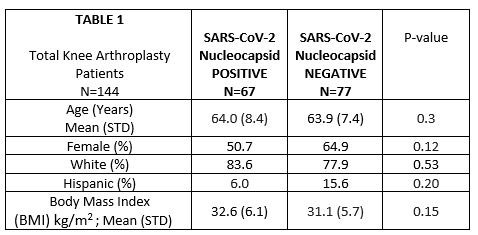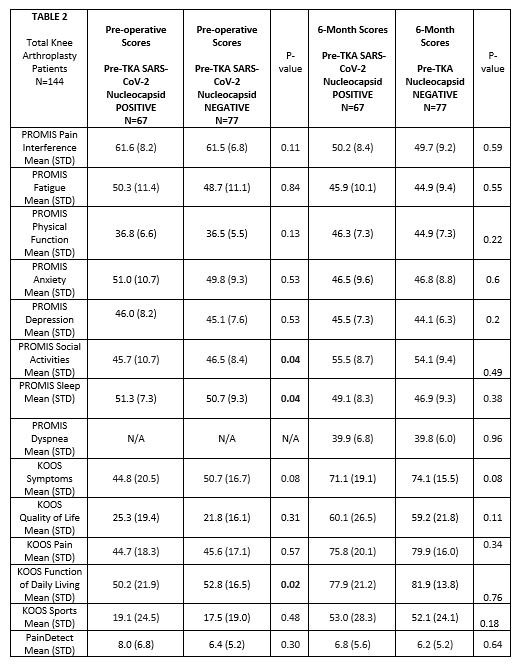Session Information
Session Type: Poster Session B
Session Time: 9:00AM-10:30AM
Background/Purpose: Over 520 million people have been infected by SARS-CoV-2. In 10-40%, disabling symptoms such as fatigue and dyspnea can persist. Risk factors for poor outcomes after both COVID19 and total knee arthroplasty (TKA) are similar. To our knowledge, whether previous SARS-CoV-2 infection is associated with poor outcomes after TKA has never been evaluated.
Methods: Patients with knee osteoarthritis (KOA) undergoing TKA were recruited from a single center between 10/2020 and 10/2021. Patients were screened pre-operatively for SARS-CoV-2 infection with a serum nucleocapsid IgG. SARS-CoV-2 IgG +ve patients were matched with SARS-CoV-2 IgG -ve patients without self-reported COVID19 on age (+/- 5 years), surgeon volume (< 50 TKA annually vs. > 50), and body mass index (BMI kg/m2 < 35 vs. > 35). Data were collected pre-operatively and at 6 months.
Results: 144/171 (67 SARS-CoV-2 IgG +ve cases and 77 SARS-CoV-2 IgG -ve controls) had baseline and 6-month data. Age 64 years (SD 7.8), women 58.3%, BMI 31.8 kg/m2 (SD 5.9), White 80.6%. 43/67 cases reported having had clinical symptoms attributed to COVID19, with a mean of 233.4 days (SD 125.6, range 17 – 444) between clinical COVID19 and TKA. Pre-operatively, there were no clinically meaningful differences in PROMIS-29 or KOOS scores between those with and without previous SARS-CoV-2 infection (Table 2). 6 months after TKA, there was similarly no difference in PROMIS-29, PROMIS Dyspnea, KOOS scores, or satisfaction with TKA between those with and without previous SARS-CoV-2. Among cases, there was no difference in KOOS or PROMIS-29 scores at 6-month comparing those with 0, 1-4 or > 5 COVID19 symptoms. There were, however, statistically significant Spearman correlations between time from clinical COVID19 to TKA and 6-month KOOS Pain (r=0.38 p=0.01), KOOS Function (r= 0.36 p=0.02), KOOS Symptoms (r=0.34 p=0.03), and PainDetect (r= -0.49 p=0.0013). Mean 6-month PainDetect scores were significantly lower in subjects with > 1 year between clinical COVID19 and TKA, (4.1 vs. 7.7 p=0.016). 4 subjects had neuropathic pain at 6 months; the 2 cases both had TKA < 300 days after COVID19. 1 of 2 controls had COVID19 post-TKA.
Conclusion: Previous SARS-CoV-2 infection was not associated with worse pain or function 6 months after TKA. However, a shorter time between TKA and clinical COVID19 was correlated with worse pain and function 6 months after TKA. Larger studies are needed to evaluate whether high-risk patients may benefit from delaying elective TKA 10-12 months after COVID19.
KOOS Subscales: 0_100; higher is better
PainDetect: _1_38; >19= neuropathic pain
To cite this abstract in AMA style:
Mandl L, Swett B, Lipschultz R, Lin M, Zhao A, Hanreich C, Sun D, Jules-elysee K, Boettner F. Is SARS-CoV-2 Associated with Worse Outcomes After Total Knee Arthroplasty? [abstract]. Arthritis Rheumatol. 2022; 74 (suppl 9). https://acrabstracts.org/abstract/is-sars-cov-2-associated-with-worse-outcomes-after-total-knee-arthroplasty/. Accessed .« Back to ACR Convergence 2022
ACR Meeting Abstracts - https://acrabstracts.org/abstract/is-sars-cov-2-associated-with-worse-outcomes-after-total-knee-arthroplasty/


